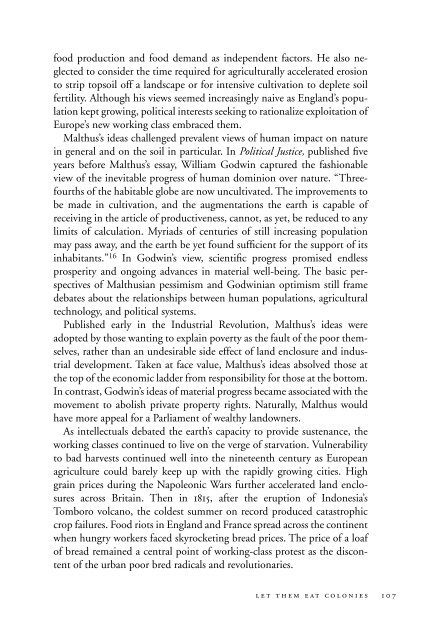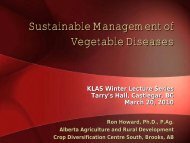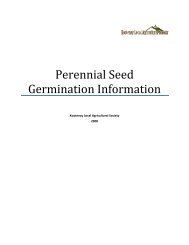Dirt: The Erosion of Civilizations - Kootenay Local Agricultural Society
Dirt: The Erosion of Civilizations - Kootenay Local Agricultural Society
Dirt: The Erosion of Civilizations - Kootenay Local Agricultural Society
Create successful ePaper yourself
Turn your PDF publications into a flip-book with our unique Google optimized e-Paper software.
food production and food demand as independent factors. He also neglected<br />
to consider the time required for agriculturally accelerated erosion<br />
to strip topsoil <strong>of</strong>f a landscape or for intensive cultivation to deplete soil<br />
fertility. Although his views seemed increasingly naive as England’s population<br />
kept growing, political interests seeking to rationalize exploitation <strong>of</strong><br />
Europe’s new working class embraced them.<br />
Malthus’s ideas challenged prevalent views <strong>of</strong> human impact on nature<br />
in general and on the soil in particular. In Political Justice, published five<br />
years before Malthus’s essay, William Godwin captured the fashionable<br />
view <strong>of</strong> the inevitable progress <strong>of</strong> human dominion over nature. “Threefourths<br />
<strong>of</strong> the habitable globe are now uncultivated. <strong>The</strong> improvements to<br />
be made in cultivation, and the augmentations the earth is capable <strong>of</strong><br />
receiving in the article <strong>of</strong> productiveness, cannot, as yet, be reduced to any<br />
limits <strong>of</strong> calculation. Myriads <strong>of</strong> centuries <strong>of</strong> still increasing population<br />
may pass away, and the earth be yet found sufficient for the support <strong>of</strong> its<br />
inhabitants.” 16 In Godwin’s view, scientific progress promised endless<br />
prosperity and ongoing advances in material well-being. <strong>The</strong> basic perspectives<br />
<strong>of</strong> Malthusian pessimism and Godwinian optimism still frame<br />
debates about the relationships between human populations, agricultural<br />
technology, and political systems.<br />
Published early in the Industrial Revolution, Malthus’s ideas were<br />
adopted by those wanting to explain poverty as the fault <strong>of</strong> the poor themselves,<br />
rather than an undesirable side effect <strong>of</strong> land enclosure and industrial<br />
development. Taken at face value, Malthus’s ideas absolved those at<br />
the top <strong>of</strong> the economic ladder from responsibility for those at the bottom.<br />
In contrast, Godwin’s ideas <strong>of</strong> material progress became associated with the<br />
movement to abolish private property rights. Naturally, Malthus would<br />
have more appeal for a Parliament <strong>of</strong> wealthy landowners.<br />
As intellectuals debated the earth’s capacity to provide sustenance, the<br />
working classes continued to live on the verge <strong>of</strong> starvation. Vulnerability<br />
to bad harvests continued well into the nineteenth century as European<br />
agriculture could barely keep up with the rapidly growing cities. High<br />
grain prices during the Napoleonic Wars further accelerated land enclosures<br />
across Britain. <strong>The</strong>n in 1815, after the eruption <strong>of</strong> Indonesia’s<br />
Tomboro volcano, the coldest summer on record produced catastrophic<br />
crop failures. Food riots in England and France spread across the continent<br />
when hungry workers faced skyrocketing bread prices. <strong>The</strong> price <strong>of</strong> a loaf<br />
<strong>of</strong> bread remained a central point <strong>of</strong> working-class protest as the discontent<br />
<strong>of</strong> the urban poor bred radicals and revolutionaries.<br />
let them eat colonies 107






